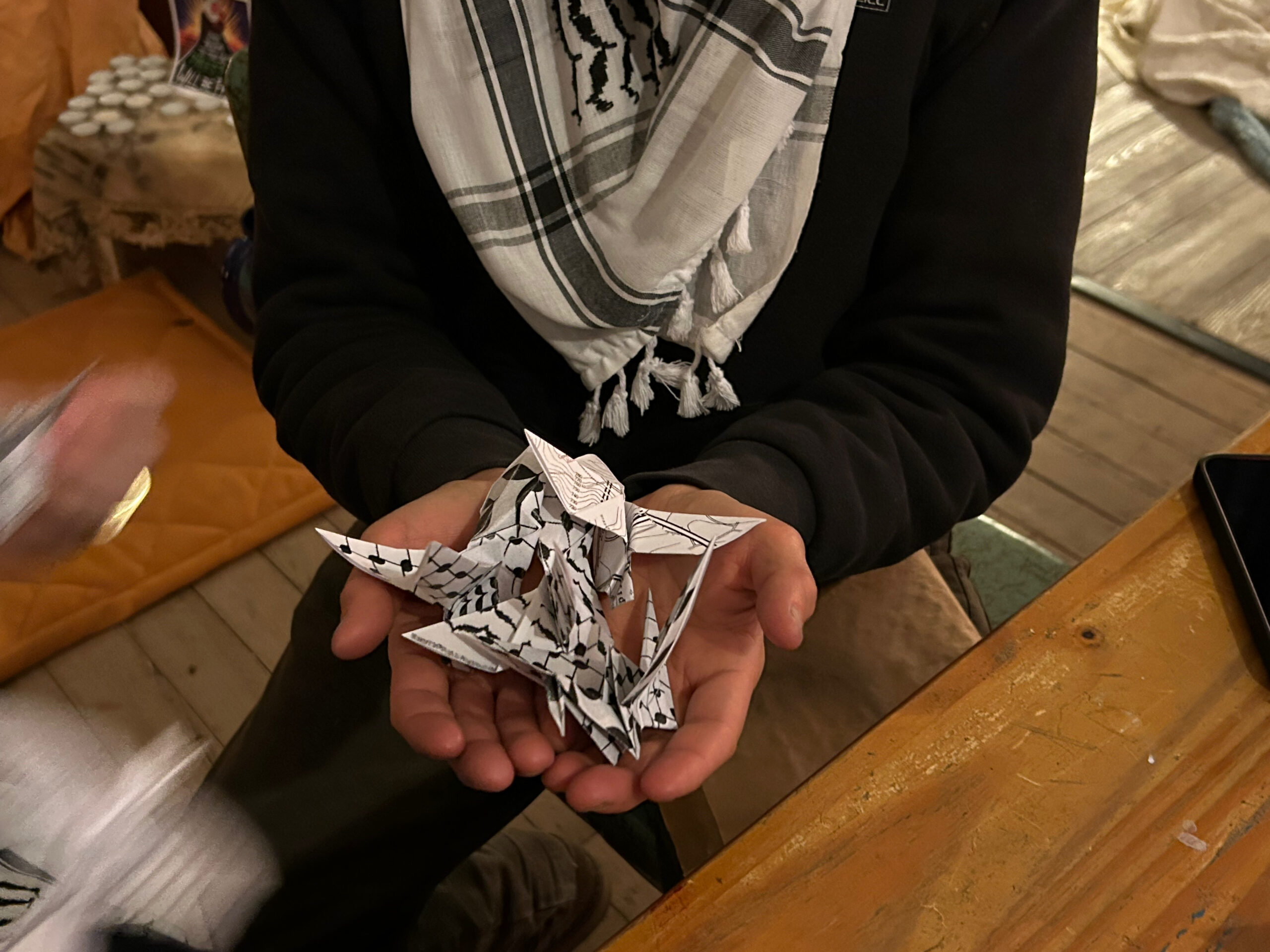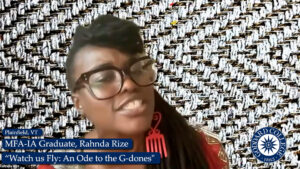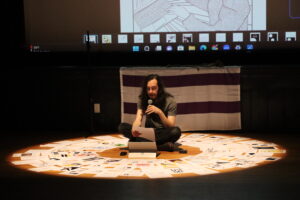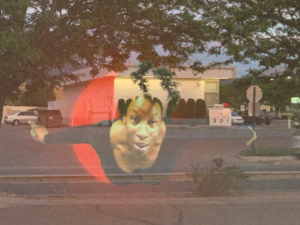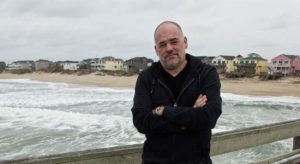 If you asked me four semesters, two years ago, when I began work at Goddard, what I expected to appreciate about it, I probably would have said “blah, blah, blah, LAC, blah, blah, blah, LAC.”
If you asked me four semesters, two years ago, when I began work at Goddard, what I expected to appreciate about it, I probably would have said “blah, blah, blah, LAC, blah, blah, blah, LAC.”
This is because I’m a product of the California public education system, which does not educate you about the East Coast of this country, let alone the highly esteemed LACs out there. Two years ago, I had only recently learned that LAC did not stand for “Los Angeles Clippers” (the basketball team) to the America outside of California.
Sure, I had heard of such places as Swarthmore, Amherst and Brown, but I just figured they were the last names of dead slave holders who hadn’t been put on the money yet. When I found out that they were actually elite colleges vested with the last names of slave holders and assorted other dead white dignitaries, their huge endowments, gothic architecture, and secluded environs made a lot more sense.
Learning where we are ignorant and looking hard at our own blindness, taking in the raw total of this world where in the end there are no teachers and no lessons as such, where there is only decision and fate, life and mystery…
I did not know that Goddard was a substantially different type of college from all the other East Coast schools with last names for names, let alone how I could describe that difference. So I came to Goddard expecting the East Coast liberal arts college experience in a West Coast nutshell: that is, a cool coastal idyl where I and my highly esteemed students would walk the campus grounds pontificating on Aristotle, Faulkner and our personal poetics, maybe a few palm trees thrown in, our garlands and togas waving in the breeze. if you would’ve told me Goddard would be somewhere to get in touch with my body and soul I would probably have believed you. Instead what I found at the Port Townsend campus was George Zimmerman in pajamas.
I’d taught until 3PM in California, caught a plane and then the final shuttle smoking got me into Fort Worden, arriving at 10PM or so. I found the key on the porch step of the home where I was to stay and thought, “This must be a pretty safe place, leaving keys out on the porch, after dark.”
I looked at the rows of homes on either side of the paved road, most dark and obviously uninhabited. I went to my room and was preparing for bed when Micheline [Marcom], Laleh [Khadivi] and voices from London and Arkansas that I’d never heard before burst into the living room. Laleh and Micheline said that they had food at their house down the way. I hadn’t eaten since breakfast.
After a few minutes I armored myself for the cold and walked outside, into the chilly, nearly unlit night. Two porch lights shone from homes across the paved road. I picked the first, closest one and as I climbed the porch steps and knocked on the door, a voice from the darkness began to yell at me.
Whoever he was, he was demanding my name, my registration— do we even need registration to be here?— I think he might’ve demanded my freedom papers, definitely he demanded I explain my purpose on these premises.
It was Get Out before Get Out came out.
He accused me of casing the joint, trying to break into the homes. It was ridiculous. The most remarkable thing was how his voice just kept rising, up and up the octaves. There was no point in trying to get a word in edgewise because he was being way too loud and he was talking a mile a minute, or fumble around in the dark and figure out which key was which and go inside because he’d either put his hands on me or call the cops. So I just stood there and waited for him to calm down, which was taking a while. Now, look, maybe you can’t relate to this, but I was a black man, in the middle of the woods, with an enraged white man accusing me of stealing stuff— this was not my Goddard dream.
Anyway, Elena [Georgiou] finally heard the commotion and came outside. This was how I met our program director, by the way. The man shouted about a curfew and the dangers of Fort Worden after dark.
[Elena rises from her seat in the audience and comes to the podium to deliver lines she, in fact, spoke.]
“What this gentleman is trying to tell you,” Elena said, “is that he is faculty with Goddard College at our residency.”
[Elena returns to her seat.]
“I’m just trying to protect you,” the man thundered at Elena.
Look, I don’t know. Anyway, Elena resolved the situation, and later she told me that in ten years nobody had bothered a Goddard employee about being out after dark.
But all things shall come to pass when you’re, well— I had been on campus for all of ten minutes—
Now, if you’re expecting a treatise on the benighted and besieged black male, I encourage you to consult the pages of your local newspaper. Because this wasn’t the first or fifteenth time this had happened to me, and because it occurred in my intellectual haven, it forced me to think about things a bit differently.
Ok, honestly, I did want to get out that night, and the following morning, and the day after that, and the day after that. Maybe I said I was coming back, but I really wasn’t planning on it. But of course I did end up planning on it because I did stay on and things got better, better mostly because of Goddard itself, the work we do here, the commitments we cultivate here
Above all else, we’re storytellers, writers and artists here, trying all of us to better our craft, which at its core involves seizing specific individuals from the welter of the world and history and the future and figuring out, in dreams and words and scenes and through the sheer luck of imagination, figuring out who they are.
The man in the pajamas was in the wrong, really, because he wasn’t a writer. What I mean by this was that his was the plight of the world without its art. The world without art redounds to the Cartesian: Mind and body are bifurcated, the mind prioritizing systems of thought, ideas and ideologies, and subordinating the bodies, the small, singular people who are little more than the disposable data of systems. Likewise, the body breaks from the soul; bodies by themselves can be starved or shot, detained, or imprisoned; they can also be lumped together, black, brown, white; African, Caucasian, citizen, immigrant, alien. The soul, ineffable, irreducible, is not so easily siphoned into a term of status.
The world without its storytelling artists is one in which data-driven fictions are the narratives that count; the world without its storytellers is one where singular souls do not count, where body and soul are split and it is the body as representative of race and nation and what-have-you that is dealt with, often harshly, often stupidly.
Now, I am not saying that politics doesn’t matter to art and to narrative: In fact, everything is political; but politics isn’t everything.
The man in the pajamas that night did not see singular beings. He could not pluck me from the welter that is our fate in this troubled land, where men who look like me supply America with many of its icons and heroes, yet we crowd prisons and the blade, where we are as frustratingly individual and irreducible as all the other complicated creatures cluttering the planet. He saw me through a certain fiction, artless, simplistic, probably color-coded and data-driven, but not in the way we strive to tell our stories, which is livingly and feelingly, small and singular, sensate to the soul, reuniting poetry’s ancient divinity with the vulnerable flesh of our passing bodies
After the first few days at the Fort, after the advisory sessions and the readings, the long days and tired nights, when it was late and dark and cold and I was quiet with myself, I returned to myself as a writer and what it is we need to do, which is not simply rally to a team, take up a position and fight. It is to see, with slow, bright, patient eyes, what there is to see.
If being a writer has taught me anything, it is patience. It is the understanding that we write our stories one word, one human experience at a time, suspending easy judgments and preconceived ways of seeing the world. In place of this rote mode of thought and action, the writer probes the personal and strives to see their world always new.
When I first got down and committed to becoming a writer, I moved to Oakland and enrolled in the MFA program at Mills College. My girlfriend told me “You’re going to grad school to become an eligible bachelor.” I had to remind her that I was not attending law school or medical school. There would be no Lamborghini S-5s in my future. (Side note: Is that even a thing? An S-5 Lamborghini? I don’t know, but it sounds like something that a corporate attorney or Kanye West would have.) I don’t know a single writer who owns a luxury vehicle, unless you count our fancy shoes.
And two years after I entered the Mills College MFA program, I graduated with a literary agent who would dump me, a girlfriend who would dump me, a novel that would never be published, and a deep confidence in myself as a lifer in the world of words and books come what may.
This is the part where I recite the litany of all my stumbles, pratfalls and failures and how I got back up and you need to, too, because that’s what life’s about and, heck, life’s a lot like writing. But who am I kidding? I’m younger than many of you, I probably know less about life than a lot of you, and I could at the very least do with a good editor to streamline some of my writing, this commencement address for instance.
But what I can tell you about is what being a writer has meant to me and how to get those slow, bright eyes.
After the MFA and a few years of community college teaching, I went back to school and completed my dissertation. The economic downturn that had kept me in school deep into adulthood turned into another bay area bubble that threatened either to employ us all or gentrify our very organs, or both. And then Dr. Tiffany Lopez told me the most liberating thing anybody said to me during the entirety of my 800 hundred years in grad school: “You know that you don’t need to actually finish the dissertation. You need to show us your ideas, your research, your vision— a path to completion.”
A path to completion. That little bit of advice gave me the license to play: To start stories without outlining their endings, to embrace the essay as journey instead of as argument.
When, in a winter month a few years ago, I published two books within just a couple weeks of one another, a kindly colleague who is not a writer asked me “How does it feel to finally be a writer?”
I answered that it felt good. But what I should have said was that it had been the preceding fifteen years and every word that I’d written in that time, published or unpublished, extant or tossed in the trash, but not book publication, that made me a writer. It was in those years that my ambition and my eyes slowed. It was in those years that I had had to watch the work of countless hours whither in two sentence emails from editors. I had had to deal with the limits of my talent and imagination.
Writing is perhaps the most humbling discipline one can subject oneself to: For when we come to the blank page, we are, all of us, no matter our accomplishments, novices again, seeking out our stories, perpetually pupils to those stories and whatever they will, in the telling, teach us. In amidst the wreckage of my best laid plans I had had to look hard at what I got wrong and start to perceive the world inside and around me more patiently.
I was not a great writer. But I had learned how to write sentences, lean, evocative sentences. I had learned that I had enough obsessions for a book or two and that a few dark faces lay coiled in the deep ice of my mind and they needed, no, demanded I free them to the page. I had learned that there is one book that the writer must write if they are ever to write anything else.
In between graduations and rejections and the occasional publication, a lot happened: Mostly, I sat at the feet of my own experience. I saw, I felt, I mourned the deaths of those closest to me. My body and my soul met in the deep crater of my despair, at the point of wide-eyed, painful vision and sudden knowledge. I became a student of human loss and why we matter
Eventually, as I said, there were books. And then at Goddard, on that cold night, I found myself a student of a sort of humanism as I stood in view of its loss and lack, not just its loss and lack in that man, but in us. After all, he was not George Zimmerman in pajamas. This man was more than his faults. He had a singular body, a singular soul. And only in sussing out that singularity could his actions be understood beyond the simple banner of his offense.
To take up the writer’s challenge is to try to always experience the world new, to understand people and allow them to speak their truth.
What I’ve found as a writer and what I’ve found here, in this haven for the writing life, is an extension of my life-long apprenticeship. The vocation I’ve sought is something more than a degree or a book contract or a writing award, but rather a way of being.
Being a writer is being a student without end and it is to be at play without end. The two are tied, study and play. Both commit us to risk and remediation, that is, to learning, always to learning: Learning one’s characters, inhabiting them, becoming as old as their history and new as their every first revelation. Learning that world building is not limited to science fiction, but is rather the province of all story, all telling.
Learning where we are ignorant and looking hard at our own blindness, taking in the raw total of this world where in the end there are no teachers and no lessons as such, where there is only decision and fate, life and mystery…
I believe that we are all still young in our journey, not because of the numbers on our birth certificates, which fall here and there along the spectrum of centuries, but because as writers we are forever the bright-eyed, open-minded, open-hearted children of this world.
So, Goddard, writers, patience, perseverance. Obviously, I didn’t let my dude in his pajamas scare me off. I stayed on. And I was rewarded for it, just as staying on with this writing life has rewarded me and, I promise, will reward you in one way or another, likely in many ways you as yet do not expect and nobody in this room full of storytellers can quite predict.
It’s such a privilege to complete this circle with you, Goddard graduates, for this is my G4 term, too: It’s been one beautiful, harrowing, exhausting, adjective-laden ride. This ain’t the Ivy League, there’s no huge endowment here, but there’s no slaveholders either.

